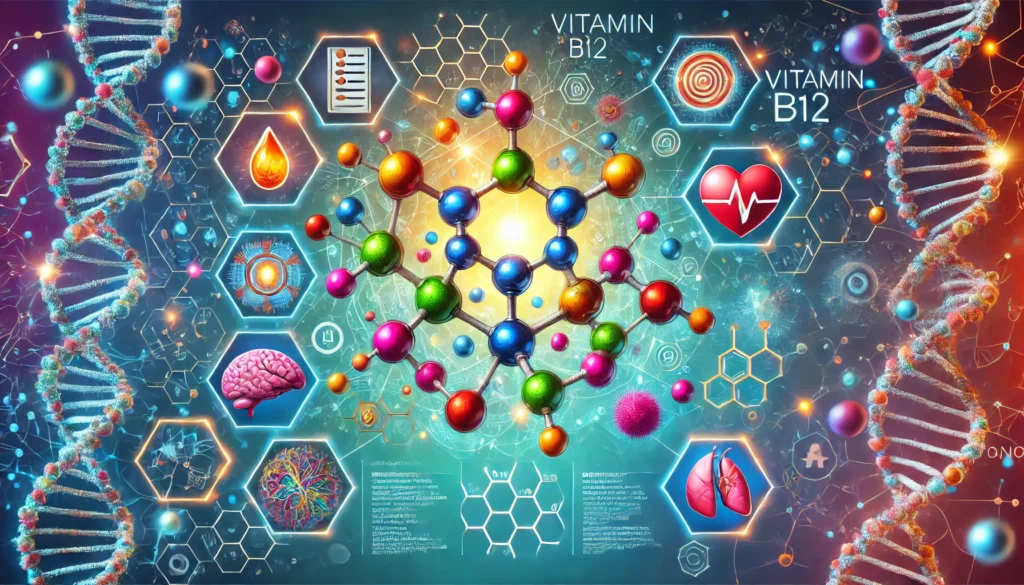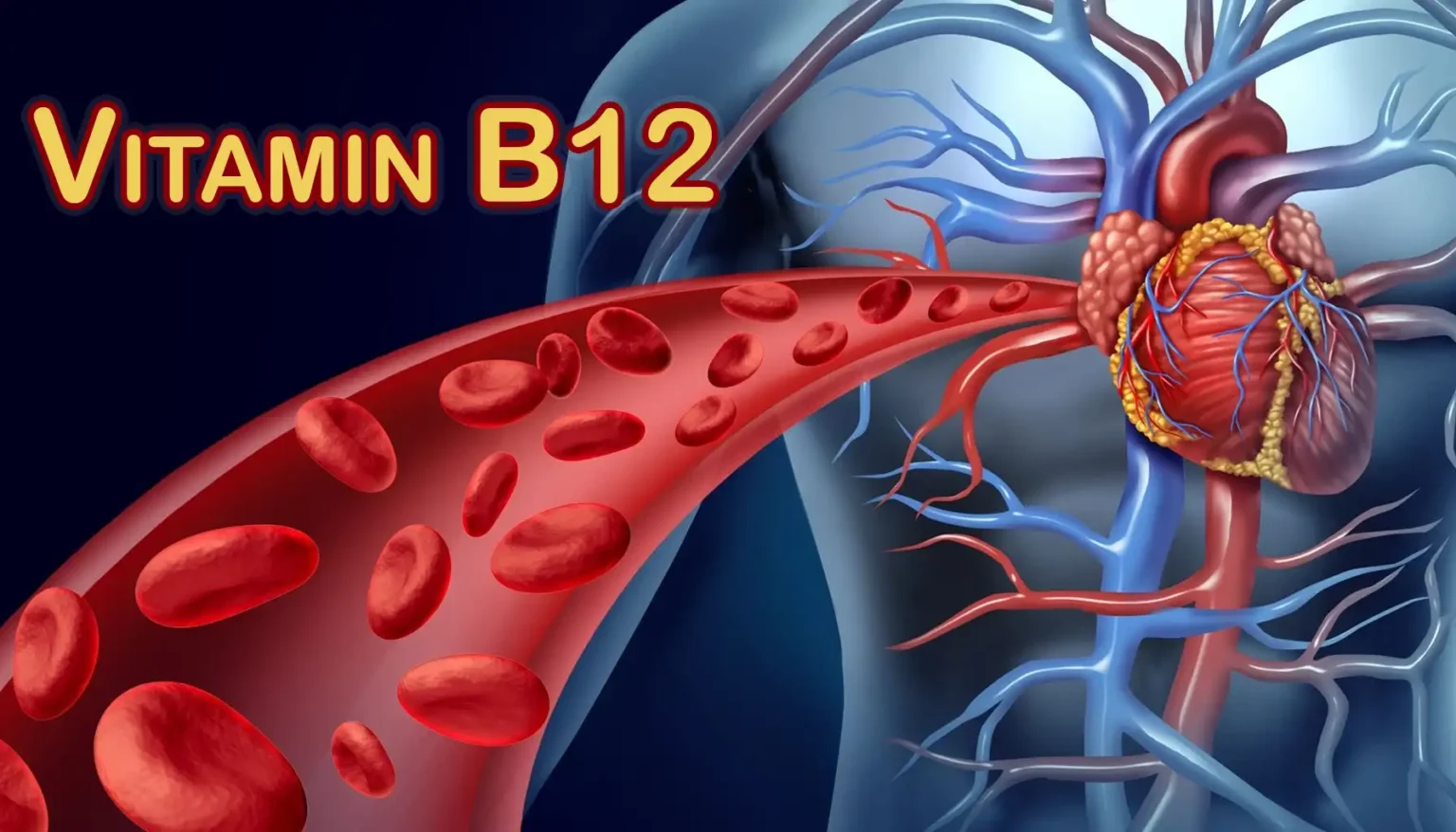Is Vitamin B12 Deficiency a Hidden Cancer Indicator?
Vitamin B12 is a crucial nutrient that helps keep our body’s nerve and blood cells healthy and helps make DNA, the genetic material in all cells. This vitamin is essential for preventing a type of anemia called megaloblastic anemia that makes people tired and weak.
Understanding nutrient deficiencies is key to maintaining good health. A lack of essential nutrients like Vitamin B12 can lead to severe and varied health issues, including the possibility of increased cancer risk. Exploring how these deficiencies might connect to such serious conditions helps us prioritize dietary and health decisions to support overall well-being.

Understanding Vitamin B12
What is Vitamin B12 and Why is it Crucial for Health?
Vitamin B12, known scientifically as cobalamin, plays an essential role in some of the body’s most critical functions. It is a key player in the synthesis of DNA, the life molecule that guides all cellular functions and genetic traits. This vitamin also ensures the proper formation and maintenance of red blood cells, which carry oxygen to every part of the body, supporting overall vitality and energy.
Furthermore, B12 is vital for neurological health; it helps maintain the integrity of the nervous system, which controls communication between the brain and the body. Vitamin B12’s role extends to the metabolic pathway, where it converts homocysteine to methionine. This conversion is crucial because elevated homocysteine levels are linked to an increased risk of heart diseases. By maintaining this balance, Vitamin B12 not only supports heart health but also helps regulate energy levels, impacting overall well-being.
Common Sources of Vitamin B12
Vitamin B12 is primarily found in animal products, making it plentiful in meats, fish, poultry, eggs, and dairy products. These sources provide the most bioavailable form of Vitamin B12, which means the body can use it more efficiently. For those who exclude animal products from their diet, such as vegetarians and vegans, getting enough B12 can be challenging.
To address this, many foods are fortified with synthetic Vitamin B12. Common fortified sources include breakfast cereals, plant-based milk, and nutritional yeast. These fortified products are essential for those following plant-based diets to maintain adequate B12 levels and prevent deficiency, which is vital for avoiding the significant health issues associated with low B12 levels. Regularly incorporating these sources into meals can help ensure sufficient intake of this crucial nutrient, safeguarding against the potential detriments of deficiency.
Signs and Symptoms of Vitamin B12 Deficiency
If you’re running low on Vitamin B12, the effects can be subtle at first but may gradually intensify, impacting various aspects of health and well-being. One of the first signs of B12 deficiency is a general feeling of fatigue and weakness. This tiredness occurs not just because of disturbed sleep patterns or intense physical activity, but because your body lacks the red blood cells needed to transport oxygen efficiently throughout your body.
Additionally, B12 deficiency can lead to neurological issues. You might experience unexplained sensations of numbness or tingling in your hands and feet, often described as ‘pins and needles.’ This happens because Vitamin B12 is crucial for the maintenance of nerve coverings that protect and insulate nerve fibers. When B12 levels are insufficient, these protective coverings start to degrade, disrupting normal nerve function.
Balance problems and memory issues are other significant symptoms that may manifest. Difficulty in maintaining balance may lead to more frequent falls, which can be particularly problematic for the elderly. Memory issues, on the other hand, might present as forgetfulness or confusion, impacting daily activities and quality of life. These cognitive and physical symptoms underscore the vital role of Vitamin B12 in brain health and nervous system function.
Given these profound effects on health, the question arises: Is Vitamin B12 Deficiency a Hidden Cancer Indicator? While deficiency itself is not a direct indicator of cancer, the severe impact on cell function and DNA synthesis could, over time, contribute to conditions that predispose individuals to cancer, highlighting the importance of maintaining adequate B12 levels.

Common Sources of Vitamin B12
Vitamin B12 is primarily sourced from animal products, making it abundant in meat, fish, poultry, eggs, and dairy products. These sources provide a rich supply of B12 that is easily absorbed by the body, playing a critical role in preventing deficiency.
For those adhering to a plant-based diet, maintaining sufficient B12 levels can be more challenging due to the absence of traditional animal-based sources. Fortified foods become a crucial alternative. Cereals, plant milks, and nutritional yeast are often fortified with Vitamin B12 and can help vegans and vegetarians meet their daily requirements. Including these fortified products in your diet is an effective way to prevent B12 deficiency and protect against the significant health issues associated with low B12 levels.
Vitamin B12 Deficiency Causes
Vitamin B12 deficiency arises from several factors that impede the body’s ability to maintain adequate levels of this crucial nutrient. A primary cause is dietary insufficiency. Individuals who consume limited animal products, such as vegans and some vegetarians, often struggle to intake sufficient quantities of Vitamin B12, as it is predominantly found in meat, fish, poultry, eggs, and dairy products.
Moreover, specific health conditions affecting the stomach and intestines can severely diminish the body’s capacity to absorb Vitamin B12. Conditions such as pernicious anemia, Crohn’s disease, celiac disease, or even those who have undergone certain gastrointestinal surgeries, find it challenging to absorb this essential vitamin efficiently.
The use of particular medications also contributes to the risk of developing Vitamin B12 deficiency. Medications such as metformin, commonly used by diabetics, and proton pump inhibitors, used to treat acid reflux and peptic ulcers, can interfere with the absorption of Vitamin B12. Consequently, individuals who rely on these medications, particularly the elderly who are more likely to be prescribed such treatments, are notably susceptible to deficiency.
The Link Between Vitamin B12 Deficiency and Cancer
The relationship between Vitamin B12 deficiency and cancer development is a subject of ongoing research, prompting the question: Is Vitamin B12 Deficiency a Hidden Cancer Indicator? Studies have indicated that long-term deficiency may be linked to an increased risk of several types of cancer, particularly those affecting the stomach and colon. The underlying theory is that Vitamin B12 is essential for proper cell replication and DNA repair. Without sufficient B12, these processes can falter, potentially leading to the development of abnormal cells that can grow uncontrollably.
Such findings underscore the critical nature of maintaining adequate B12 levels, not just for overall health but potentially as a preventative measure against certain cancers. This connection highlights the importance of dietary vigilance and medical oversight, especially for those at increased risk of deficiency.
Common Sources of Vitamin B12
Ensuring a sufficient intake of Vitamin B12 is crucial for preventing deficiency and its associated health risks. Vitamin B12 is naturally abundant in animal products such as meat, fish, poultry, eggs, and dairy products, providing a rich source that is readily absorbed by the body.
For individuals following plant-based diets, fortified foods play an essential role in maintaining adequate Vitamin B12 levels. Products such as fortified cereals, plant milks, and nutritional yeast are vital for vegans and vegetarians to include in their diets to ensure they meet their daily nutritional requirements and avoid the complications associated with Vitamin B12 deficiency.
Case Studies and Research
Recent case studies and research have increasingly pointed to a correlation between Vitamin B12 deficiency and an elevated risk of cancer. These studies not only highlight the significance of Vitamin B12 in maintaining cellular health but also suggest how its deficiency could potentially contribute to cancer development. For example, research has shown that lower levels of B12 might be linked with higher rates of colorectal cancer, suggesting that the vitamin plays a role in moderating cancer-promoting processes at the cellular level. These findings serve as critical reminders of the importance of early diagnosis and proactive health management to mitigate such risks.
Diagnosing Vitamin B12 Deficiency
Diagnosing Vitamin B12 deficiency is typically conducted through comprehensive blood tests which assess the levels of the vitamin, along with markers such as methylmalonic acid and homocysteine. These markers can help identify even subtle deficiencies. Additionally, clinical evaluations might involve neurological assessments, where symptoms such as numbness, memory lapses, and impaired balance are checked to further confirm a deficiency. This thorough approach ensures that potential health issues related to B12 deficiency are addressed promptly.
Treatment Options for Vitamin B12 Deficiency
Addressing Vitamin B12 deficiency is pivotal, especially when considering the question: can vitamin B12 deficiency be a sign of cancer? Effective treatment strategies are integral to restoring normal B12 levels and ensuring optimal bodily function. These strategies typically include dietary adjustments to incorporate B12-rich sources such as meats and dairy products. For individuals who have absorption issues or adhere to vegan or vegetarian diets, supplementation through B12 pills or injections becomes indispensable. By implementing these treatment options, one can swiftly correct deficiencies, thus supporting both neurological and hematological health, and potentially mitigating associated cancer risks.
Preventive Measures
Preventive strategies for maintaining adequate Vitamin B12 levels include regular dietary monitoring and the inclusion of B12 sources in meals. Regular screenings and medical check-ups are particularly important for high-risk groups such as the elderly and individuals with existing gastrointestinal disorders, who are more susceptible to absorption issues. Proactive measures are crucial in preventing B12 deficiency and its associated complications.
Myths vs. Facts
It’s important to dispel common myths surrounding Vitamin B12, especially regarding its link to cancer. While it is true that maintaining sufficient levels of B12 is crucial for overall health, there is no evidence to suggest that B12 supplements directly prevent cancer. Instead, they help prevent B12 deficiency-related conditions that might indirectly influence cancer risk.
Expert Opinions
Experts such as oncologists and nutritionists stress the importance of regular monitoring of Vitamin B12 levels as part of a comprehensive health strategy. Maintaining adequate levels of B12 is not only essential for reducing potential cancer risk but also crucial for overall well-being, highlighting the integral role of this vitamin in health maintenance.
Conclusion
While it is not definitively established that Vitamin B12 deficiency directly causes cancer, the vital role it plays in maintaining cellular functions and DNA stability cannot be overlooked. This deficiency might indirectly increase cancer risk by affecting cellular health and genetic integrity. Recognizing the signs of Vitamin B12 deficiency and addressing them promptly is a crucial preventive health measure. As we consider whether can vitamin B12 deficiency be a sign of cancer, it becomes clear that maintaining adequate levels of this essential nutrient is key to minimizing potential health risks and enhancing overall well-being.
Ressources
- Understanding Vitamin B12 Deficiency and Treatment:
- Vitamin B12 deficiency can arise from insufficient dietary intake, especially in vegetarians and vegans, as B12 is predominantly found in animal products. Conditions that affect absorption, like gastritis or surgeries affecting the stomach or intestines, also contribute to deficiency. Additionally, certain medications like metformin or proton pump inhibitors can reduce B12 absorption. Regular intake of Vitamin B12 through diet or supplements is crucial for those at risk to prevent the associated neurological and hematological issues.
- Treatment Options:
- The standard treatment for Vitamin B12 deficiency involves replacing the missing vitamins through injections or tablets. Initial treatment typically includes frequent injections of vitamin B12 (hydroxocobalamin), followed by maintenance doses which might be required throughout life, depending on the underlying cause of the deficiency. For dietary causes, daily oral supplements might be recommended, and for non-dietary causes, regular injections may be necessary.
- Link to Cancer Risk:
- Long-term deficiency in Vitamin B12 may contribute to an increased risk of certain cancers due to its crucial role in DNA synthesis and repair. Addressing and managing B12 deficiency is considered an essential component of preventive health care.
- General Advice and Monitoring:
- It’s recommended to monitor B12 levels regularly through blood tests, especially after starting treatment, to ensure that the supplementation is effective. Monitoring might continue with periodic assessments depending on the individual’s response to treatment and ongoing risk factors.
For more detailed information, you can visit these comprehensive resources:

